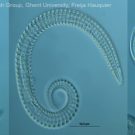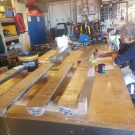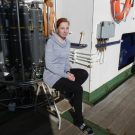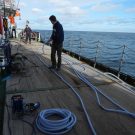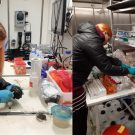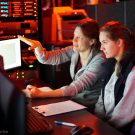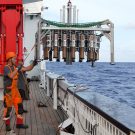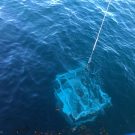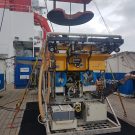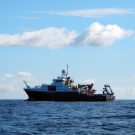by Dr. Freija Hauquier, Ghent University Underneath the seafloor lies an entire world of small animals crawling between the sediment grains, well hidden from the human eye at first glimpse. Yet they are numerous, diverse, and equally deserve our attention in the context of deep-sea mining. Sure, studying them requires a bit more patience than […]
The taste of sediment
by Henko de Stigter (Royal Netherlands Institute for Sea Research, NIOZ) Until somebody came up with the idea of mining polymetallic nodules from the abyssal depths of the Pacific Ocean, this place was one of the remotest and quietest on our planet. Far away from the brute natural forces of storms, floods, landslides, tsunamis and […]
Der letzte Tag an Bord
Unglaublich, aber heute ist schon der letzte Tag meiner Seereise. Die vergangenen Tage sind wie im Flug vergangen. Etwas wehmütig stehe ich an der Reling und schaue über das scheinbar unendlich reichende Wasser. Morgen früh fliegen zwei weitere Wissensschaftler und ich von Aberdeen aus nach Hause, unsere Arbeit ist dann getan. Die Poseidon wird aber […]
Ziel erreicht: Goldeneye!
Mittlerweile kennen wir den Meeresboden hier am Goldeneye ziemlich gut. Am 14.05. hatte ich von unserem Plan, die erste CTD über dem Aufbau des Experiments ins Wasser zu lassen, berichtet. In den Tagen danach wurde dieser Vorgang mehrmals wiederholt und wir konnten viele Proben sammeln. Der Blick auf die Geräte unter Wasser ist faszinierend, wie […]
Take the chance / Ergreif die Chance
Impression of our youngest scientist (deusch s.u.) Hi, my name is Ann-Kathrin Weßels and I study Biology. I am currently working at the DZMB in Wilhelmshaven at my Bachelor Thesis. I took the chance and left daily life behind for two months for my biggest adventure so far. Thursdays 21st of march: After a brief […]
Grüße von der RRS JAMES COOK
Der größte Teil meiner Fahrtzeit ist mittlerweile vorbei und ich durfte viele spannende Erfahrungen machen. Da es meine erste Seereise war, war alles neu für mich und ich wusste vorher nicht, was mich erwarten wird. Auf der James Cook, unser britisches Partnerschiff vor Ort, fährt auch eine Studentin mit. Für sie ist die Forschung ein […]
A small world between grains / Eine kleine Welt zwischen den Sandkörnern
by Dr. Sven Rossel, Katja Uhlenkott und Ann-Kathrin Weßel (deutsch s.u.) “Ah, you’re playing with mud again.” That is something biologists and geologists hear quite often on board. And yes, we are one of the parties “playing with mud”. But actually we, the biologists from Senckenberg, German Centre for Marine Biodiversity Research, are not interested […]
Fantastische Neuigkeiten!
Nachdem die letzten Tage intensiv an der Reparatur des gebrochenen Kabels für das Unterwasser-Massenspektrometer gearbeitet wurde, gibt es jetzt eine Lösung mit der das Gerät einsatzbereit ist. Euer Daumen drücken hat geholfen! (Wisst ihr noch?) Bevor es auf einer Station eingesetzt wird soll es vorher einmal getestet werden. An dem geplanten Morgen versammeln sich alle […]
The ROV on board SONNE 268
The largest and probably most expensive scientific equipment on board of RV SONNE on the present leg is a remotely operated deep-diving “robot” called ROV KIEL 6000. “ROV” is the abbreviation for “Remotely Operated Vehicle”. The ROV provides “eyes and arms in the deep sea”. ROV KIEL 6000, which got its name from the city […]
Unser Ziel: Goldeneye!
Nach unserer letzten Station geht es weiter quer über die Nordsee, unser Ziel: Goldeneye! Eine weitere Ölplattform löst sich aus dem Schatten der Abenddämmerung heraus, wir sind angekommen. Doch nicht nur wir haben dieses Ziel anvisiert, dort liegt noch ein weiteres Forschungsschiff, die James Cook. Unser Zusammentreffen ist kein Zufall, wir werden im Teamwork ein […]
